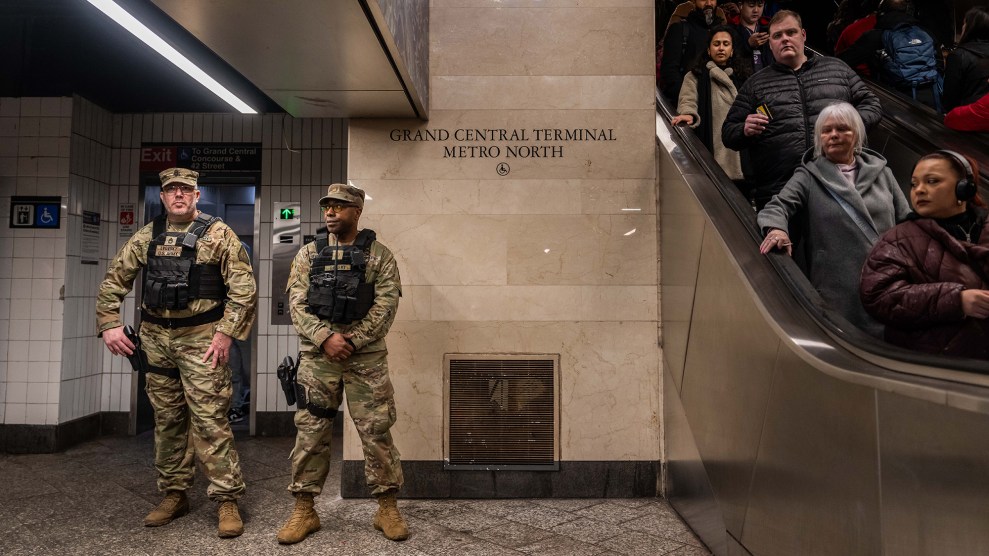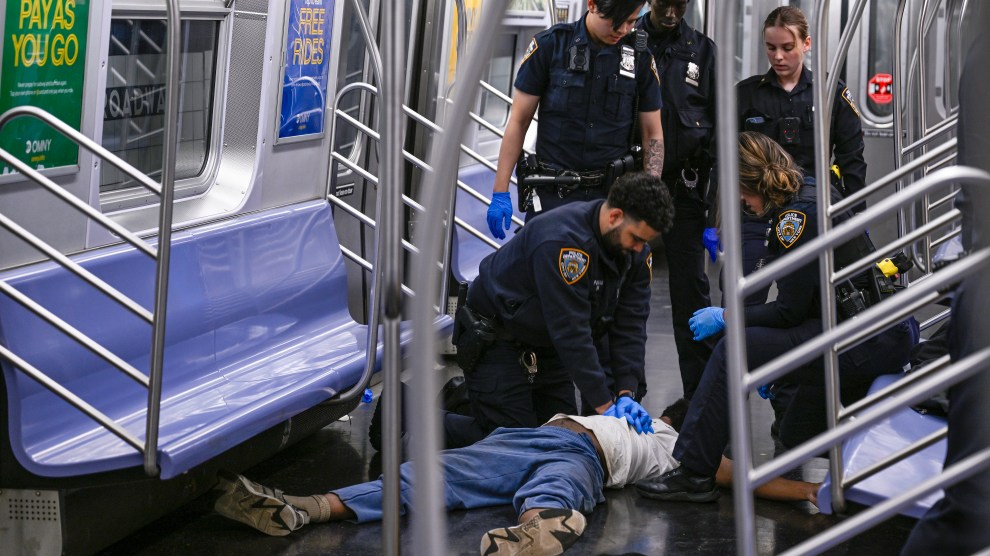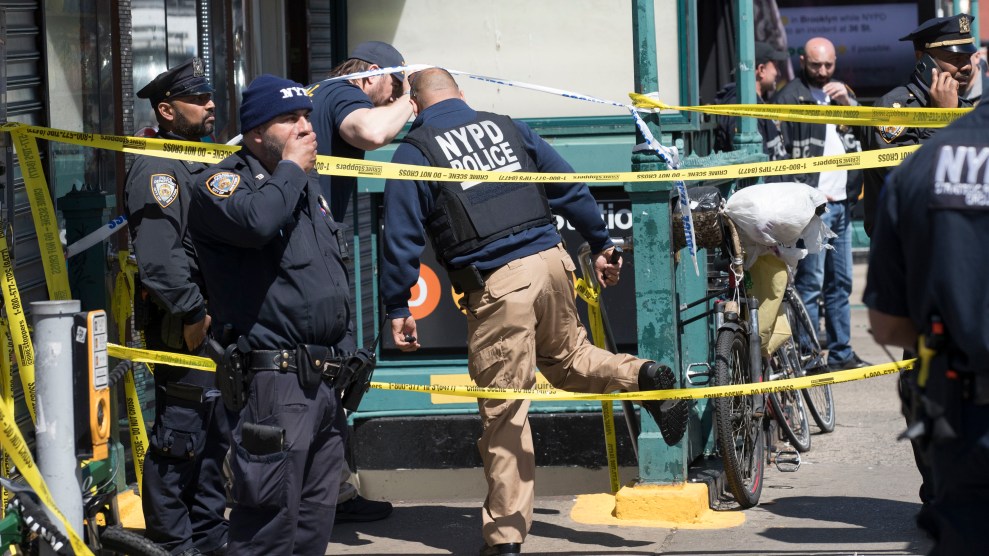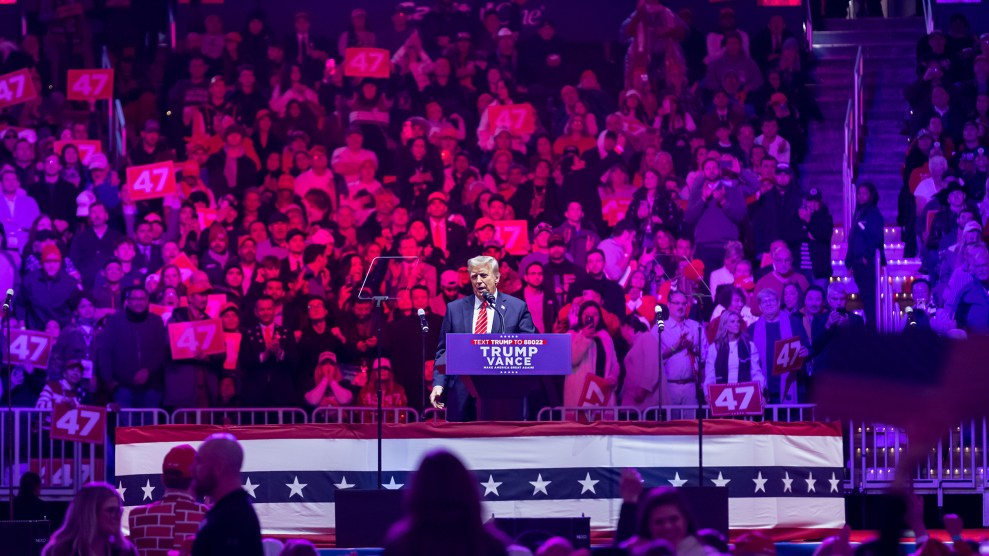
New York State Police, MTAPD and New York National Guard patrol and conduct container inspections at Grand Central Station on March 6, 2024 in New York City.Adam Gray/Getty
New York Gov. Kathy Hochul’s announcement last week that she was deploying 750 National Guard soldiers to patrol the city’s subway system came as something of a shock.
Several violent incidents had taken place on the subway in recent weeks. But there were no increased threats of a possible terrorist attack; it had only been a month since Mayor Eric Adams, who was conspicuously absent from Hochul’s press conference on Wednesday, was touting a significant drop in subway crime. Adding to the confusion was Hochul’s own admission that the decision to send troops underground had little to do with facts. Crime on the subway, as she told Good Day New York, was faring “much better,” but still required an extreme strategy designed to address a “psychology” contributing to some New Yorkers’ perceptions that violence is rampant. Hochul repeated the justification the next morning, acknowledging that crime on the subway was not “statistically significant.”
What is lost when heavily armed law enforcement officials are used to respond to crises, real or imagined? When people are instructed to “go home,” as Hochul flippantly suggested, should they refuse to submit? I talked to Donna Lieberman and Michael Sisitzky, the executive director and assistant policy director, respectively, from the New York Civil Liberties Union to discuss Hochul’s order—and the alarming proposal that seeks to go even further.
Talk me through your initial reactions to learning of Gov. Hochul’s announcement.
Donna Lieberman: This is a WTF moment. Like other New Yorkers, we are experiencing a bit of political whiplash… In one week, the mayor takes a victory lap and tells us how safe the streets and subway are, thanks to him. The next week, when the data shows that the city spent 40 times more in overtime for police than the year before, he tells us that there’s a crime wave. The latest announcement from our governor is quite stunning.
We share the public concern for being able to walk around the streets of New York City and ride the subways safely. We also appreciate the need to feel safe, which is not necessarily correlated to the data or the reality. But the mayor and governor are not doing New Yorkers a favor when they cherry-pick data to manipulate us into feeling safe or unsafe in order to suit their politics. There have been some awful incidences on the subway recently—and no one should try to belittle their seriousness—but the overreaction and overreach feel like an effort to regress to the bad old days of Rudy Giuliani and broken windows policing, which was devastating to our city. It’s jolting.
Speaking of Eric Adams, all this follows the order in which he tasked police officers with removing people who appear mentally ill from the streets. Both of these policies, which come from Democrats, feel like a major over-reliance on law enforcement to fix what clearly are more systemic issues.
DL: Making the police the first line of defense for every social issue is incredibly misguided. It’s not good for public safety—and it’s not good for public health. Nor is it beneficial for the well-being of New Yorkers more broadly. It doesn’t create housing; doesn’t create medical care; doesn’t create drug treatment; doesn’t create jobs; doesn’t create stability. We should not be pushing police into roles and responsibilities for which they are neither trained nor suited. Because when we try to do that, we divert enormous amounts of money desperately needed elsewhere. When times are flush, it’s a problem. When times are lean, it’s disastrous.
Michael Sisitzky: A lot of what we’re seeing in this approach, similar to other recent safety plans for the subway, is not about responding to statistically significant increases in crime. This is about people’s perceptions and feelings. What [Hochul and Adams] are hearing is that people supposedly feel unsafe. But in fact, they’re being forced to confront visible signs of poverty.
So what are we doing? Instead of investing in the types of services that can get unhoused New Yorkers out of the subway and receiving the mental health treatments they need and deserve, we are going to invest in the same kind of failed broken windows and aggressive policing that we always have been using.
How does an outsized police presence create an environment of fear?
DL: Whenever the police ramp up their engagement with New Yorkers, the people who are most impacted are Black and brown New Yorkers. They have claimed for decades that this is random. But I would bet the farm that the [National Guard] program will overwhelmingly impact Black and brown New Yorkers.
When the police are in our faces—or in this case, when the National Guard is in our faces with submachine guns in the subways— they are creating tension. They are creating a flashpoint for conflict where the populations most likely to be hurt are brown and Black New Yorkers.
What should subway riders who don’t want to have their bags checked know? What rights do they have here?
DL: They implemented the bag search policy after 9/11. We challenged it in court and lost because of the counterterrorism justification. But the bag searches Hochul has ordered are not about terrorism. They’re about criminal law enforcement. The New York Civil Liberties Union is going to look very closely at this program as it rolls out because this may very well be unconstitutional.
MS: Subway riders are going to have to be prepared to make a decision because resisting potentially risks arrest. If you get pulled aside for a random search, you’re not required to consent to that search. But then you’re not going to be allowed to go through the turnstile. If folks who resist are told to leave the station for not consenting to a search and then try to go through anyway, that’s where it could escalate to some kind of enforcement action.
Hochul seemed extremely dismissive when asked about riders who may not want their bags searched, telling people who resist to “go home” if they don’t submit. I couldn’t help but see immense privilege in that option. Being forced to walk three avenue blocks to another subway station and then having to possibly make time for several transfers because of this is not nothing. And for many New Yorkers, calling an Uber is simply not a practical option.
MS: There are also so many stations within the subway system that are not accessible to New Yorkers with disabilities. And these individuals are not left with any real choice. It speaks to the fact that what we’re witnessing here is not sound policy. It’s security theater.
Let’s talk about Hochul’s separate proposal to ban people who have been convicted of violent crimes from the subway for three years. Seems pretty unconstitutional, no?
DL: In New York, the subway is a lifeline. It’s the way people connect with friends and families, go to work, go to the doctor, go to the movies, receive drug treatment, see their probation officer, go to court. So banning somebody from the subway is cutting off their legs, literally. It’s also counterproductive because as a society, we don’t want people to be isolated from their whole support system. We need people to be engaged in society. As for enforceability, facial recognition technology is not ready for this. Legally, this is all questionable at best.
MS: This is an unnecessarily punitive and vindictive ban that, if passed, would prevent New Yorkers who have already been convicted, and in some cases, already served a sentence and trying to reenter society, being faced with an additional societal barrier. A three-year ban from the subway would make it impossible to get back on their feet, re-establish their lives, re-establish connections in their communities, get employment, visit friends and family. This is setting it setting New Yorkers up for failure.
It’s going to lead to people having more touches with the criminal legal system, because we have now made it impossible for people to go about their lives. Also, look at the scope. It’s not just banning people for conduct inside trains and buses. It’s written in such a way that it would expand to conduct that occurs in or is adjacent to an MTA facility.
If you think about what that looks like in New York City, that’s pretty much anywhere you go: a sidewalk next to a subway station, a public roadway where an MTA bus passes. It is so ripe for abuse. We’re talking about a broad application for banning countless people for conduct that doesn’t even have any meaningful connection to the MTA. It’s a proposal from the governor, that the legislator needs to reject outright.
This interview has been edited for length and clarity.














